Vitamin E: The Antioxidant Powerhouse for Health and Well-being
Vitamin E is a vital nutrient that plays a crucial role in maintaining our health and well-being. It's often referred to as the "antioxidant powerhouse" due to its powerful antioxidant properties. From protecting our cells against damage to supporting heart health and immune function, vitamin E is an essential nutrient that deserves our attention. In this article, we will delve into the world of vitamin E, exploring its functions, sources, benefits, and guidelines for incorporating it into our daily lives.
What is Vitamin E?
Vitamin E is a fat-soluble vitamin that belongs to a family of compounds known as tocopherols and tocotrienols. These compounds come in different forms, with alpha-tocopherol being the most biologically active form in the human body. Natural food sources such as nuts, seeds, vegetable oils, and green leafy vegetables are rich in vitamin E. This nutrient acts as a potent antioxidant, working to neutralize harmful free radicals and protect our cells from oxidative damage.
The Antioxidant Properties of Vitamin E
The antioxidant properties of vitamin E are integral to its role in promoting health and preventing chronic diseases. As an antioxidant, vitamin E helps protect our cells from oxidative stress caused by free radicals. Oxidative stress occurs when there is an imbalance between the production of free radicals and the body's ability to neutralize them with antioxidants.
To ensure an adequate intake of vitamin E, it's essential to incorporate foods rich in this nutrient into our diet. Vitamin E can be found in a variety of foods, particularly those that are rich in healthy fats. Here are some common food sources of vitamin E:
Nuts and Seeds: Almonds, sunflower seeds, hazelnuts, and peanuts are excellent sources of vitamin E. These can be enjoyed as a snack or added to meals and salads.
Leafy Green Vegetables: Spinach, Swiss chard, and kale contain vitamin E. These vegetables can be incorporated into salads, stir-fries, or smoothies.
Avocado: This creamy fruit is not only a great source of healthy fats but also contains vitamin E. Enjoy it sliced on toast, in salads, or as a guacamole dip.
It's important to note that the exact vitamin E content in foods can vary depending on factors such as storage, processing, and cooking methods. To ensure you're getting sufficient vitamin E, aim for a diverse and balanced diet that incorporates a variety of these food sources. By including a variety of vitamin E-rich foods, you maximize the potential health benefits associated with this essential nutrient. Moreover, consuming a diverse range of foods ensures that you obtain other important nutrients and antioxidants that work synergistically with vitamin E to support overall health.
While obtaining vitamin E through whole foods is ideal, supplementation may be necessary in certain cases, such as individuals with malabsorption issues or specific medical conditions. However, it's important to consult with a healthcare professional before starting any supplementation regimen. They can provide guidance on the appropriate dosage and help monitor potential interactions with medications or existing health conditions.

Infants (0-6 months): 4 mg/day
Breastfed infants typically receive sufficient vitamin E through breast milk.
Formula-fed infants should receive formula fortified with vitamin E.
Infants (7-12 months): 5 mg/day
As solid foods are introduced, they can contribute to vitamin E intake.
Children (1-3 years): 6 mg/day
Foods rich in vitamin E should be included in the child's diet.
Examples include nuts, seeds, vegetable oils, and fortified cereals.
Children (4-8 years): 7 mg/day
Similar to the previous age group, a varied diet with vitamin E-rich foods is important.
Adolescents (9-13 years): 11 mg/day
During the rapid growth phase, meeting the recommended intake is crucial.
Adults (14 years and older): 15 mg/day
The recommended intake for adults, including pregnant and breastfeeding women, is 15 mg/day.
Consuming a balanced diet that includes sources of vitamin E helps meet these requirements.
It's worth noting that these guidelines are based on the Dietary Reference Intakes (DRIs) established by various health authorities. It's important to consult with a healthcare professional or registered dietitian before starting any supplements to ensure proper dosage and suitability for your individual needs.
Remember, a balanced and varied diet, including foods rich in vitamin E, such as nuts, seeds, vegetable oils, leafy greens, and fortified cereals, can help you meet your daily vitamin E needs and support overall health.
Vitamin E is a fat-soluble vitamin that belongs to a family of compounds known as tocopherols and tocotrienols. These compounds come in different forms, with alpha-tocopherol being the most biologically active form in the human body. Natural food sources such as nuts, seeds, vegetable oils, and green leafy vegetables are rich in vitamin E. This nutrient acts as a potent antioxidant, working to neutralize harmful free radicals and protect our cells from oxidative damage.
The Antioxidant Properties of Vitamin E
The antioxidant properties of vitamin E are integral to its role in promoting health and preventing chronic diseases. As an antioxidant, vitamin E helps protect our cells from oxidative stress caused by free radicals. Oxidative stress occurs when there is an imbalance between the production of free radicals and the body's ability to neutralize them with antioxidants.
Research studies have highlighted the potent antioxidant effects of vitamin E. A study published in the Journal of the American College of Cardiology found that higher vitamin E intake was associated with a reduced risk of coronary heart disease (CHD) in women. The researchers suggested that the antioxidant properties of vitamin E may help prevent the oxidation of LDL cholesterol, a key factor in the development of CHD.
Vitamin E offers a wide range of health benefits due to its potent antioxidant properties. Let's explore some of the key advantages of incorporating vitamin E into your diet:
Powerful Antioxidant Protection: Vitamin E functions as a potent antioxidant, helping to protect cells from oxidative damage caused by free radicals. Studies have shown that vitamin E can help reduce oxidative stress and inflammation in the body (1). It plays a crucial role in preventing or slowing down chronic diseases such as cardiovascular disease, cancer, and neurodegenerative disorders (2).
Skin Health and Aging: Vitamin E is renowned for its benefits to skin health. It helps protect the skin from damage caused by environmental factors, such as UV radiation and pollution. Additionally, vitamin E promotes skin hydration, reduces the appearance of wrinkles, and improves overall skin texture and tone
Immune System Support: Vitamin E plays a vital role in maintaining a healthy immune system. It helps modulate immune responses and enhances the body's defense against infections and diseases. Vitamin E's immune-boosting properties are particularly important for older adults, who may experience age-related declines in immune function. In a systematic review published in the journal Nutrients, researchers concluded that vitamin E supplementation positively influenced immune responses, especially in individuals with certain immune-related disorders
Eye Health: Vitamin E plays a crucial role in maintaining optimal eye health. It acts as an antioxidant that protects the cells of the eyes from oxidative damage, which can contribute to the development of age-related macular degeneration (AMD) and cataracts (11). Adequate vitamin E intake has been associated with a reduced risk of these eye conditions
Vitamin E deficiency is relatively rare but can have significant implications for your health. When your body lacks sufficient vitamin E, it may lead to various consequences and symptoms.
Another study published in the Journal of Clinical Medicine explored the role of vitamin E in protecting against neurodegenerative diseases, such as Alzheimer's disease. The researchers found that vitamin E supplementation exhibited antioxidant effects, reducing oxidative damage and inflammation in the brain. These findings suggest that vitamin E may play a role in maintaining cognitive function and preventing neurodegenerative disorders.
Furthermore, vitamin E's antioxidant properties extend to its protective effects on the skin. A study published in the Journal of Investigative Dermatology examined the impact of vitamin E on skin health and photoaging. The researchers found that vitamin E supplementation reduced UV-induced oxidative stress and protected against damage caused by exposure to sunlight. This highlights the potential of vitamin E in maintaining skin health and preventing premature aging.
The Health Benefits of Vitamin E
Furthermore, vitamin E's antioxidant properties extend to its protective effects on the skin. A study published in the Journal of Investigative Dermatology examined the impact of vitamin E on skin health and photoaging. The researchers found that vitamin E supplementation reduced UV-induced oxidative stress and protected against damage caused by exposure to sunlight. This highlights the potential of vitamin E in maintaining skin health and preventing premature aging.
Vitamin E offers a wide range of health benefits due to its potent antioxidant properties. Let's explore some of the key advantages of incorporating vitamin E into your diet:
Powerful Antioxidant Protection: Vitamin E functions as a potent antioxidant, helping to protect cells from oxidative damage caused by free radicals. Studies have shown that vitamin E can help reduce oxidative stress and inflammation in the body (1). It plays a crucial role in preventing or slowing down chronic diseases such as cardiovascular disease, cancer, and neurodegenerative disorders (2).
Consequences of Vitamin E Deficiency
Vitamin E deficiency is relatively rare but can have significant implications for your health. When your body lacks sufficient vitamin E, it may lead to various consequences and symptoms.
Here are some potential effects of vitamin E deficiency:
Neurological Issues: Deficiency in vitamin E may result in neurological problems such as muscle weakness, difficulty coordinating movements, impaired vision, and problems with speech.
Muscle Weakness and Atrophy: Vitamin E deficiency can contribute to muscle weakness and muscle tissue breakdown. This can lead to muscle wasting, reduced muscle strength, and difficulties with physical activities.
Immune System Impairment: Insufficient vitamin E levels may weaken the immune system's ability to fight off infections, making you more susceptible to illness and slower to recover.
Skin Issues: Vitamin E plays a role in maintaining healthy skin by protecting it from oxidative damage. Deficiency in vitamin E may result in dry, rough, or scaly skin and impaired wound healing.
Vision Problems: Inadequate vitamin E levels may increase the risk of eye conditions such as cataracts and age-related macular degeneration (AMD).
Reproductive and Fertility Issues: Vitamin E deficiency has been linked to reproductive problems in both men and women. In males, it may contribute to reduced sperm quality and fertility issues. In females, it may lead to menstrual irregularities.
It's important to note that severe vitamin E deficiency is rare and typically occurs in individuals with specific medical conditions that impair fat absorption, such as certain digestive disorders or liver diseases. However, even mild deficiencies can have subtle effects on your health over time.
Food Sources of Vitamin E
Neurological Issues: Deficiency in vitamin E may result in neurological problems such as muscle weakness, difficulty coordinating movements, impaired vision, and problems with speech.
Muscle Weakness and Atrophy: Vitamin E deficiency can contribute to muscle weakness and muscle tissue breakdown. This can lead to muscle wasting, reduced muscle strength, and difficulties with physical activities.
Immune System Impairment: Insufficient vitamin E levels may weaken the immune system's ability to fight off infections, making you more susceptible to illness and slower to recover.
Skin Issues: Vitamin E plays a role in maintaining healthy skin by protecting it from oxidative damage. Deficiency in vitamin E may result in dry, rough, or scaly skin and impaired wound healing.
Vision Problems: Inadequate vitamin E levels may increase the risk of eye conditions such as cataracts and age-related macular degeneration (AMD).
Reproductive and Fertility Issues: Vitamin E deficiency has been linked to reproductive problems in both men and women. In males, it may contribute to reduced sperm quality and fertility issues. In females, it may lead to menstrual irregularities.
It's important to note that severe vitamin E deficiency is rare and typically occurs in individuals with specific medical conditions that impair fat absorption, such as certain digestive disorders or liver diseases. However, even mild deficiencies can have subtle effects on your health over time.
To ensure an adequate intake of vitamin E, it's essential to incorporate foods rich in this nutrient into our diet. Vitamin E can be found in a variety of foods, particularly those that are rich in healthy fats. Here are some common food sources of vitamin E:
Nuts and Seeds: Almonds, sunflower seeds, hazelnuts, and peanuts are excellent sources of vitamin E. These can be enjoyed as a snack or added to meals and salads.
Vegetable Oils: Wheat germ oil, sunflower oil, and safflower oil are high in vitamin E. These oils can be used for cooking or as a dressing for salads.
Leafy Green Vegetables: Spinach, Swiss chard, and kale contain vitamin E. These vegetables can be incorporated into salads, stir-fries, or smoothies.
Avocado: This creamy fruit is not only a great source of healthy fats but also contains vitamin E. Enjoy it sliced on toast, in salads, or as a guacamole dip.
Fish and Seafood: Certain types of fish and seafood, such as salmon, trout, and shrimp, contain small amounts of vitamin E. Incorporate them into your diet as part of a balanced meal plan.
Fortified Foods: Some breakfast cereals, bread, and plant-based milk alternatives may be fortified with vitamin E. Check the product labels to ensure they contain added vitamin E.
Vitamin E Supplementation
While obtaining vitamin E through whole foods is ideal, supplementation may be necessary in certain cases, such as individuals with malabsorption issues or specific medical conditions. However, it's important to consult with a healthcare professional before starting any supplementation regimen. They can provide guidance on the appropriate dosage and help monitor potential interactions with medications or existing health conditions.

Recommended daily intake and guidelines for different age groups
The recommended daily intake of vitamin E varies depending on age, sex, and life stage. The following are the general guidelines for vitamin E intake:Infants (0-6 months): 4 mg/day
Breastfed infants typically receive sufficient vitamin E through breast milk.
Formula-fed infants should receive formula fortified with vitamin E.
Infants (7-12 months): 5 mg/day
As solid foods are introduced, they can contribute to vitamin E intake.
Children (1-3 years): 6 mg/day
Foods rich in vitamin E should be included in the child's diet.
Examples include nuts, seeds, vegetable oils, and fortified cereals.
Children (4-8 years): 7 mg/day
Similar to the previous age group, a varied diet with vitamin E-rich foods is important.
Adolescents (9-13 years): 11 mg/day
During the rapid growth phase, meeting the recommended intake is crucial.
Adults (14 years and older): 15 mg/day
The recommended intake for adults, including pregnant and breastfeeding women, is 15 mg/day.
Consuming a balanced diet that includes sources of vitamin E helps meet these requirements.
It's worth noting that these guidelines are based on the Dietary Reference Intakes (DRIs) established by various health authorities. It's important to consult with a healthcare professional or registered dietitian before starting any supplements to ensure proper dosage and suitability for your individual needs.
Remember, a balanced and varied diet, including foods rich in vitamin E, such as nuts, seeds, vegetable oils, leafy greens, and fortified cereals, can help you meet your daily vitamin E needs and support overall health.
In conclusion, vitamin E is a vital nutrient with powerful antioxidant properties that contribute to overall health and well-being. Its role in protecting cells from damage, supporting immune function, and promoting cardiovascular health makes it an essential part of a balanced diet.

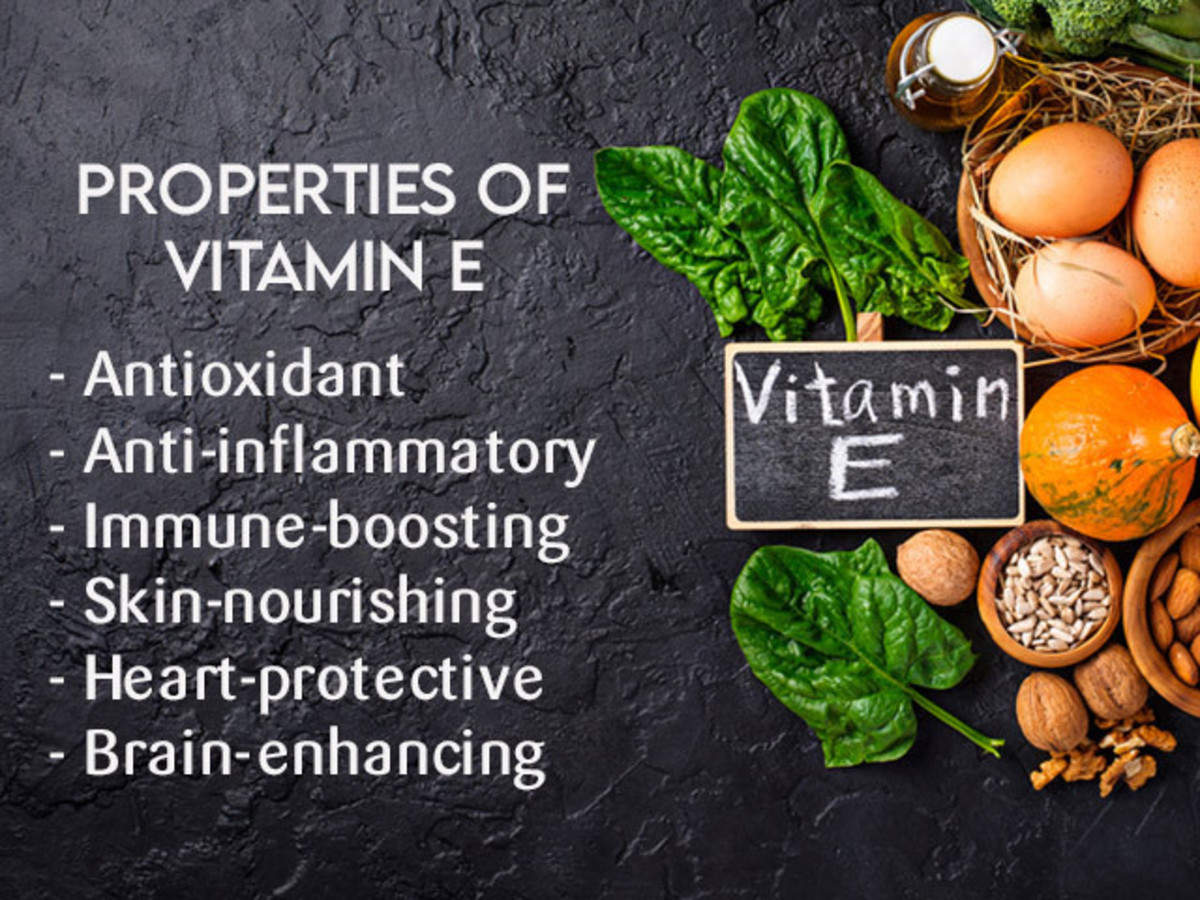
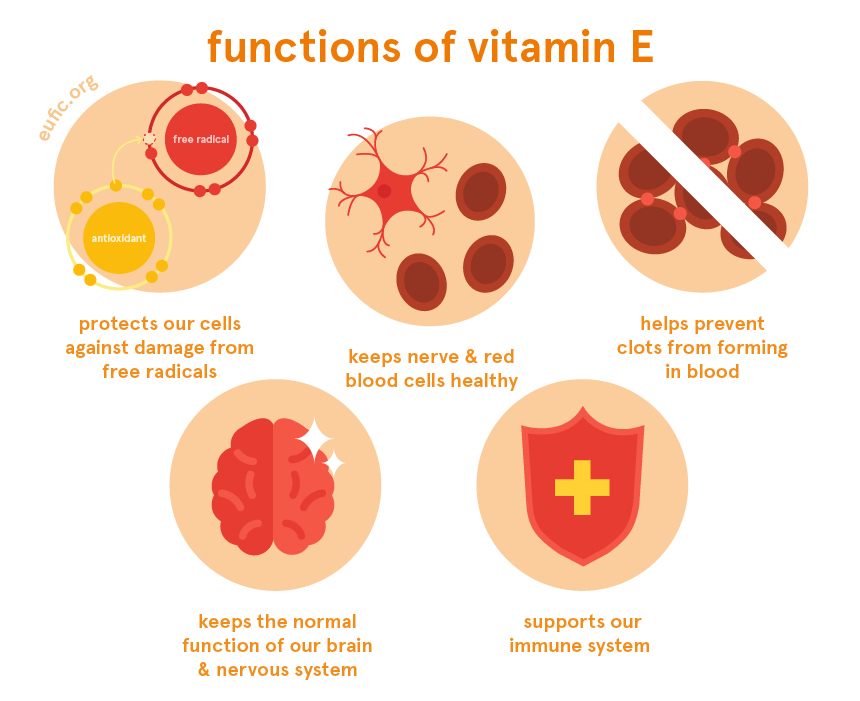
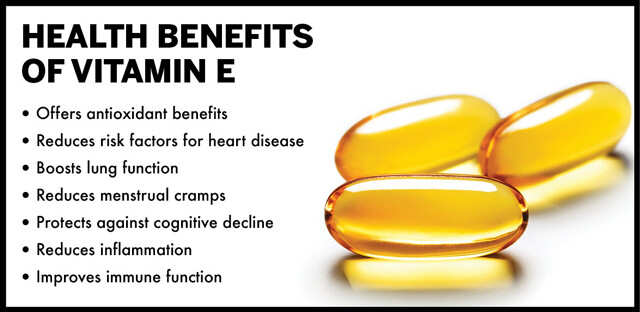
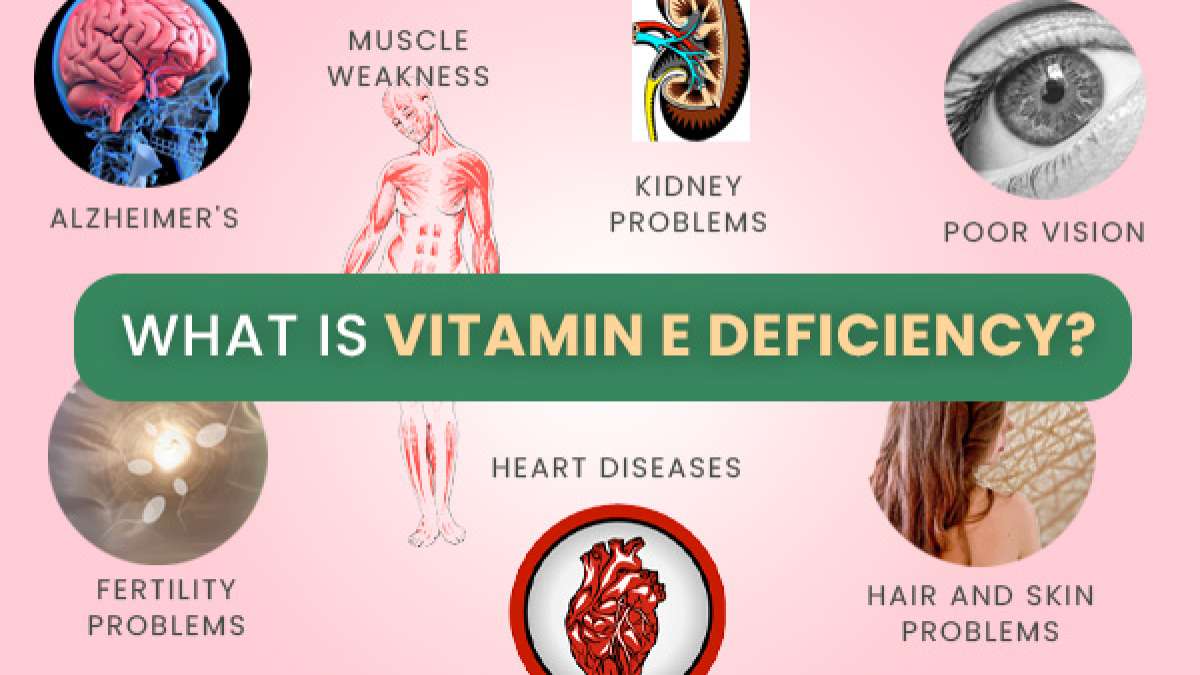


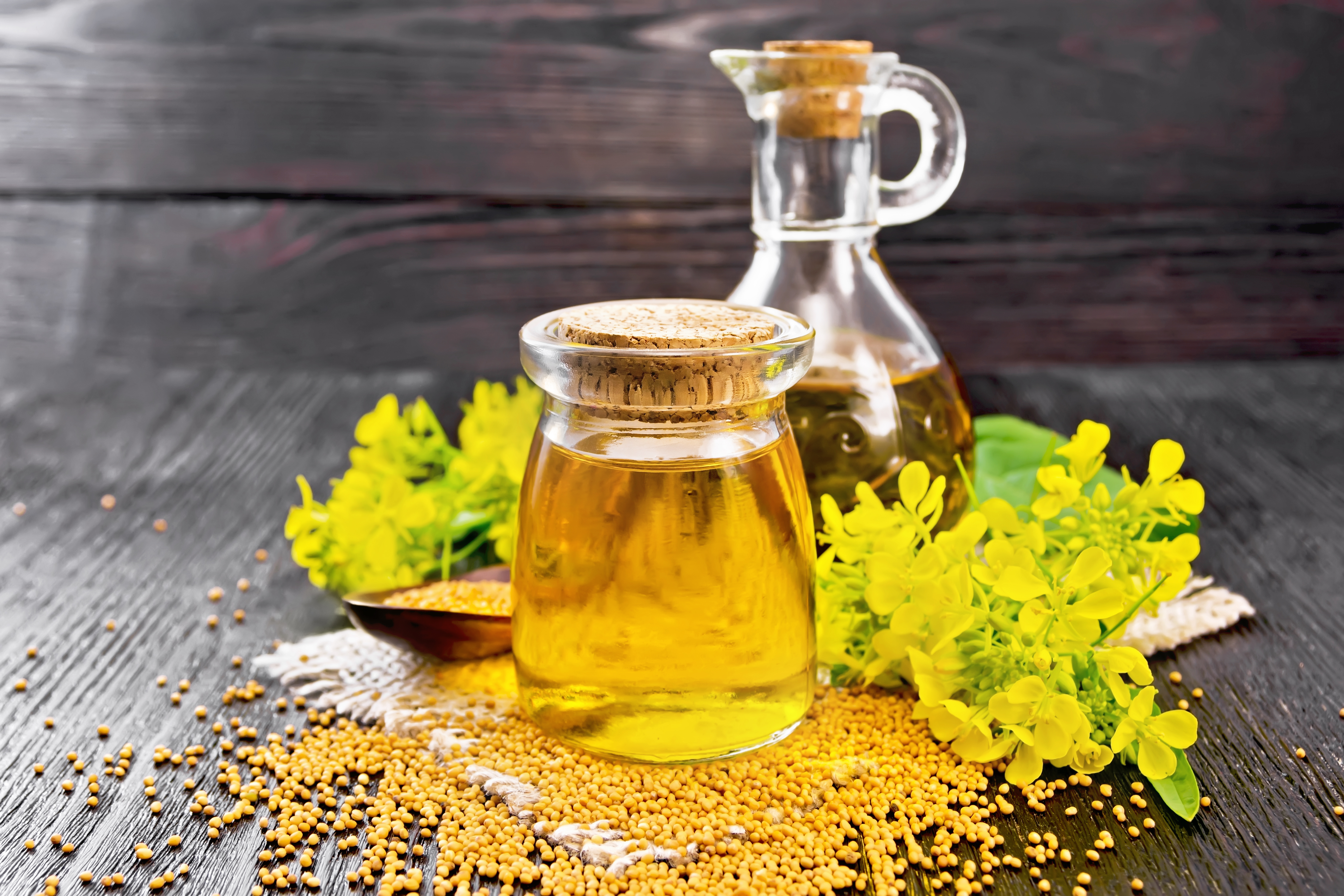


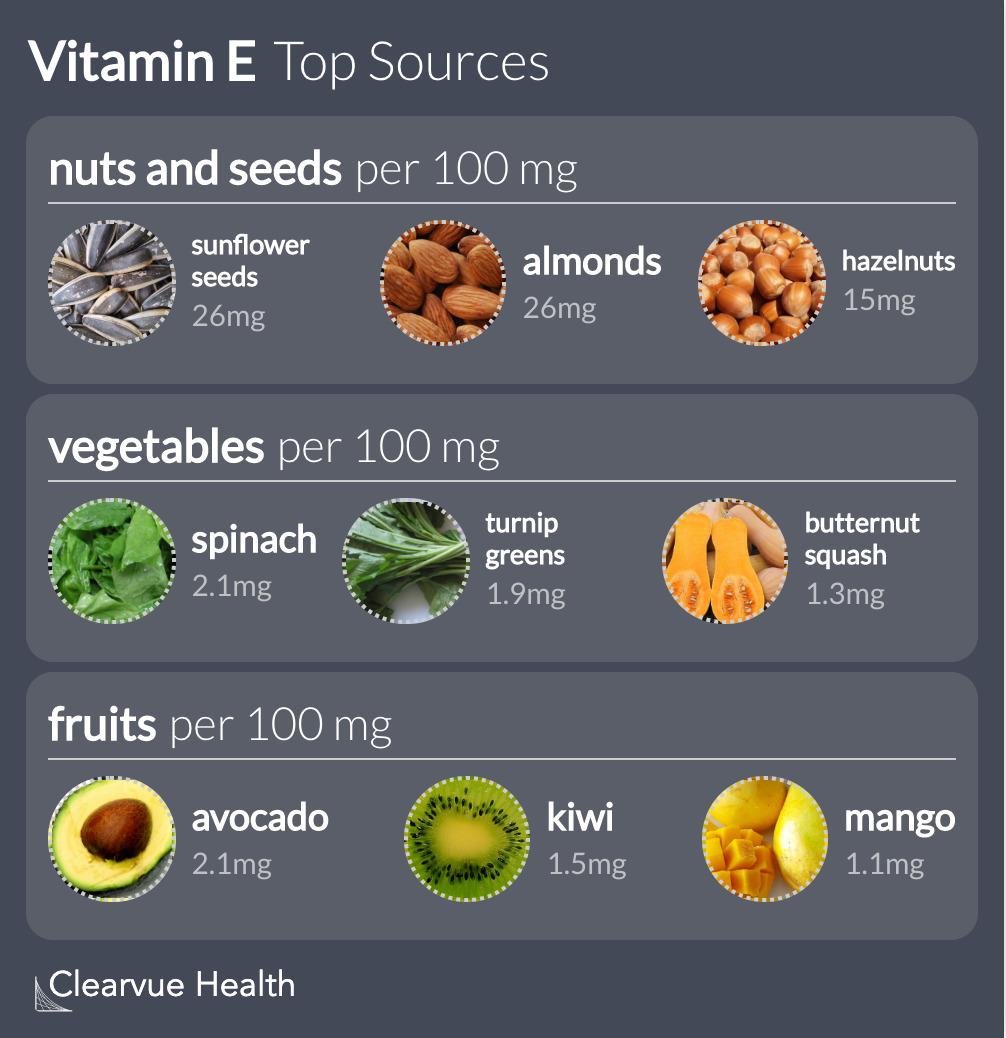
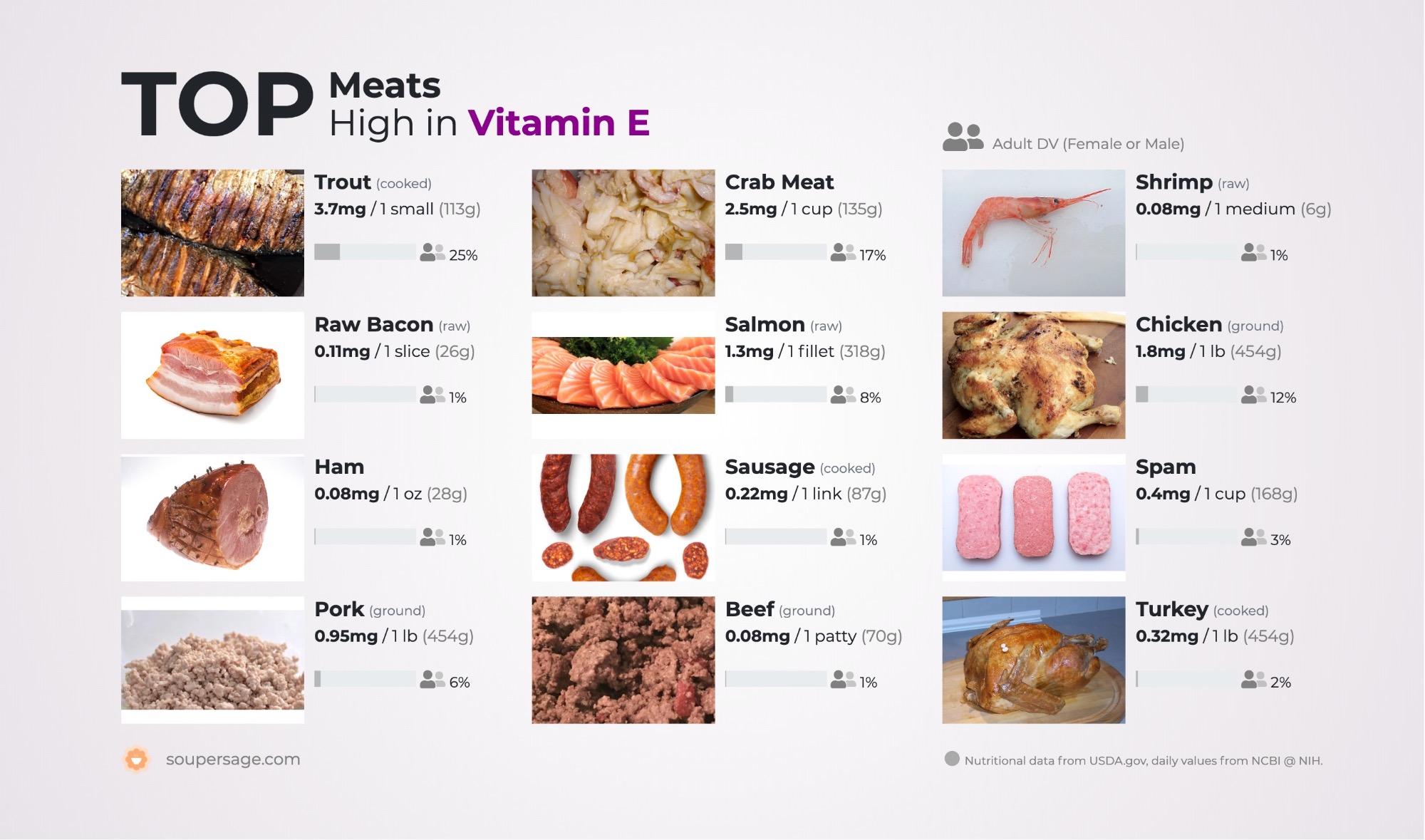

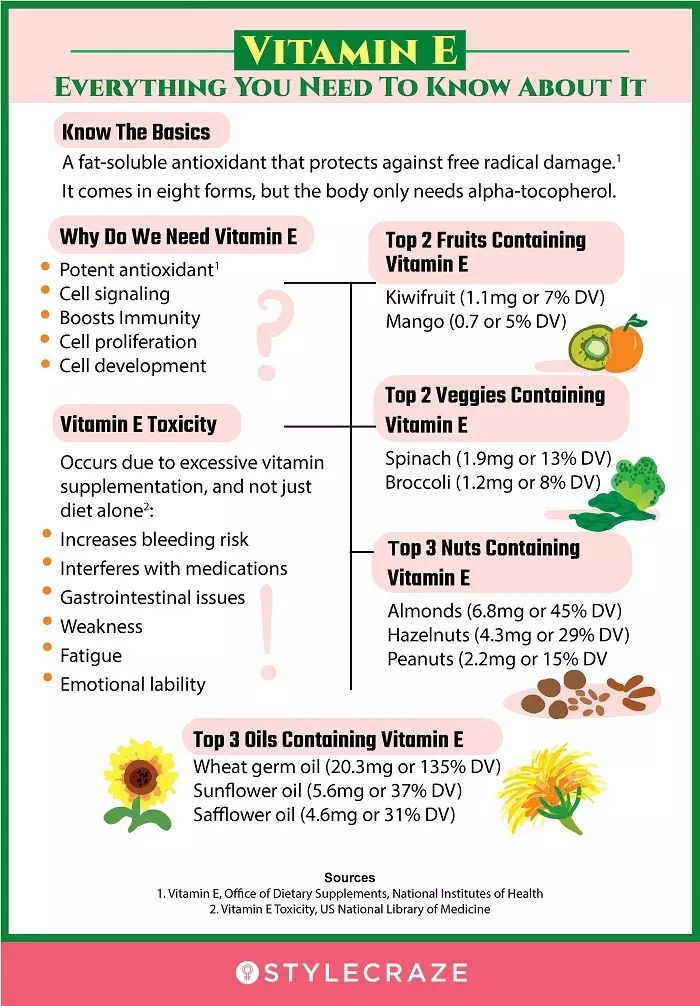

Comments
Post a Comment